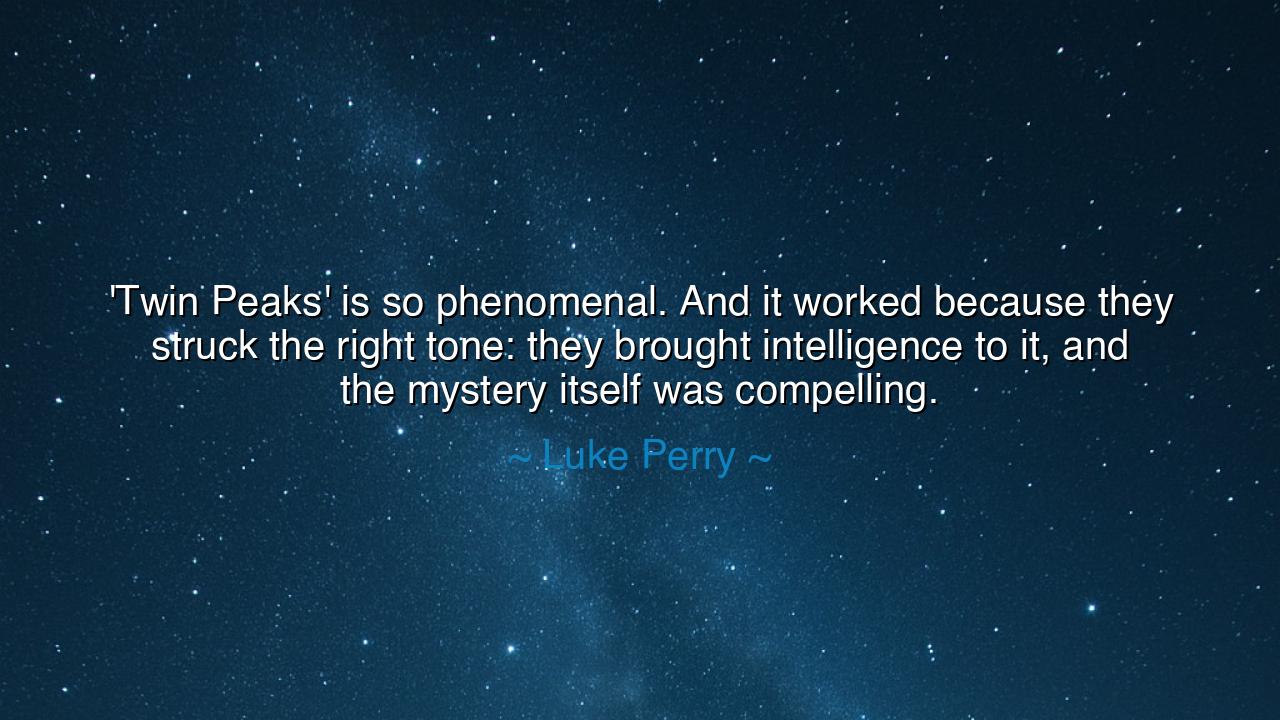
'Twin Peaks' is so phenomenal. And it worked because they struck
'Twin Peaks' is so phenomenal. And it worked because they struck the right tone: they brought intelligence to it, and the mystery itself was compelling.






The Harmony of Mystery and Mind
Among the storytellers of our age, few works have shone so strangely and so deeply as the television series “Twin Peaks.” And of it, the actor Luke Perry once said: “‘Twin Peaks’ is so phenomenal. And it worked because they struck the right tone: they brought intelligence to it, and the mystery itself was compelling.” In these words, simple yet profound, lies an ancient truth—one that reaches beyond art, beyond cinema, and into the heart of how humans seek meaning in the world. Perry’s reflection reminds us that it is not spectacle or noise that makes something endure, but the balance of mind and mystery, of clarity and wonder, that awakens the soul.
The origin of this quote lies in Perry’s admiration for a show that defied convention. Created by David Lynch and Mark Frost, “Twin Peaks” emerged in the early 1990s as something wholly new: part crime story, part dream, part meditation on the strange currents beneath ordinary life. It was a drama wrapped in riddles—a place where loggers, detectives, and spirits shared the same space, and where every answer gave birth to another question. When Perry spoke of its success, he was not praising mere entertainment, but the alchemy of art and intellect that made it eternal. For to strike the right tone in storytelling—or in life—is to find harmony between the known and the unknown.
The ancients understood this balance well. They told their myths not only to explain, but to mystify. The Greeks gave us the Oracle of Delphi, whose riddles revealed truths only to those who could see beyond words. The Egyptians filled their temples with symbols, teaching through silence as much as sound. They knew, as Perry recognized, that intelligence alone is dry, and mystery alone is chaos—but when the two walk together, wisdom is born. The creators of “Twin Peaks” became modern oracles, offering their audience a glimpse into that same sacred paradox.
In every age, there is a hunger for mystery—for something greater than our daily routines and our rational minds can explain. Yet modern man, proud of his knowledge, often starves this hunger. He seeks logic where he should seek poetry; he dissects where he should listen. “Twin Peaks,” like the myths of old, invited viewers to feel again the uncertainty that gives meaning to truth. It asked not merely “Who killed Laura Palmer?” but “What lies behind the masks we wear? What shadows move beneath our small towns and quiet hearts?” Its success was not in solving its riddles, but in reminding the world that not all riddles should be solved.
Luke Perry, himself a student of storytelling through his work as an actor, understood that tone—that delicate balance of intellect and emotion—is what separates the hollow from the profound. Just as a bard must tune his lyre before singing, so too must an artist tune the soul of his work. A story may be filled with beauty, but without intelligence it wanders; it may be filled with wisdom, but without wonder it dies. “Twin Peaks” endured because it was intelligent enough to challenge, yet mysterious enough to haunt—because it awakened both the mind and the imagination.
This lesson extends far beyond art. In our own lives, we must also learn to strike the right tone—between logic and passion, knowledge and curiosity, confidence and humility. A life governed only by intellect becomes rigid; one ruled only by mystery drifts like fog. The wise live between these realms, using intelligence as a lantern and mystery as the night that gives that lantern purpose. To live this way is to see the world as a story still being written, full of clues, symbols, and hidden meanings awaiting discovery.
So take from Luke Perry’s reflection this enduring wisdom: embrace the mystery of life, but meet it with intelligence. Be curious, but not careless; thoughtful, but never dull. When you create—whether it is art, a conversation, or a life itself—seek that sacred tone where truth and beauty meet. Do not rush to solve every mystery; some must be felt, not explained. For it is in that space between knowledge and wonder that we find the heartbeat of creation—the same rhythm that pulsed in the myths of old and still echoes in the strange, haunting beauty of “Twin Peaks.”
And remember this: mystery is not the enemy of reason—it is its companion. To understand everything is to lose the thrill of being alive. But to stand in awe, intelligent and awake, before the unknown—that is where art, wisdom, and the soul of humanity begin.






AAdministratorAdministrator
Welcome, honored guests. Please leave a comment, we will respond soon